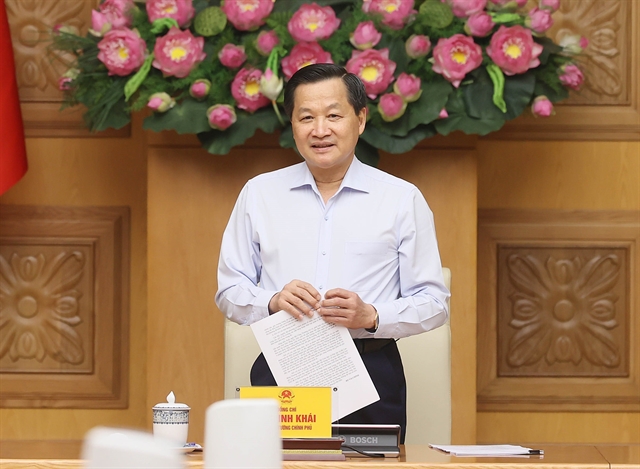 Economy
Economy

 |
| Deputy Prime Minister Lê Minh Khái chairs the meeting on price management. — VNA/VNS Photo |
HÀ NỘI — Price management measures implemented in the first five months of the year could help effectively control inflation, with the CPI rising by 4.03 per cent compared to the same period in 2023, said Deputy Prime Minister Lê Minh Khái.
Chairing a meeting of the Steering Committee for Price Management in Hà Nội, Deputy PM Khái, who is also the committee's head, stressed the importance of achieving macroeconomic stability and controlling inflation within the National Assembly's targets.
The Government has directed ministries, sectors and localities to enforce rigorous macroeconomic measures, ensuring the smooth supply, circulation and distribution of goods and services, particularly strategic commodities like petrol and electricity and enhancing logistics connectivity to boost the consumption and export of agricultural and aquatic products.
Since the beginning of the year, the Ministry of Industry and Trade (MoIT) has closely coordinated with the Ministry of Finance on petrol price management.
With the current adjustment cycle, the price difference between adjustments is minimal, allowing businesses to plan their petrol imports effectively.
The current petrol stockpile is 1.8 million tonnes and in the second and third quarters of 2024, petrol supply is expected to meet market demand.
Regarding electricity, the MoIT is working with relevant ministries to verify the production and business costs of electricity for 2024.
They are drafting a circular to guide the calculation of the average retail electricity price, which is currently available for public consultation on the ministry's website. The circular is expected to be issued in August.
On Wednesday Deputy Finance Minister Lê Tấn Cận forecasted continued pressure on prices for the rest of 2024, emphasising the need to maintain the market price roadmap and accurately assess costs for state-managed goods and services.
Tuition fees for public schools are expected to remain stable, while adjustments in university and vocational education fees will stick to set ceilings.
Electricity price adjustments, due to fluctuating input costs and increased demand, may contribute to inflation.
A 10 per cent increase in household electricity prices would contribute to a 0.33 percentage point CPI increase.
Domestic airfare prices are likely to rise further, reflecting global trends, while essential goods and services may also see price fluctuations.
The Deputy Minister of Finance mentioned that global inflation might ease in 2024, which could help Việt Nam tackle imported inflation and boost confidence in controlling inflation.
Domestic agriculture is anticipated to thrive, ensuring ample food supply for both local consumption and exports, further easing price pressures.
Tax support policies in 2024, like cutting environmental taxes on fuel and expected VAT reductions on select goods and services, will help lower costs, including gasoline prices. — VNS